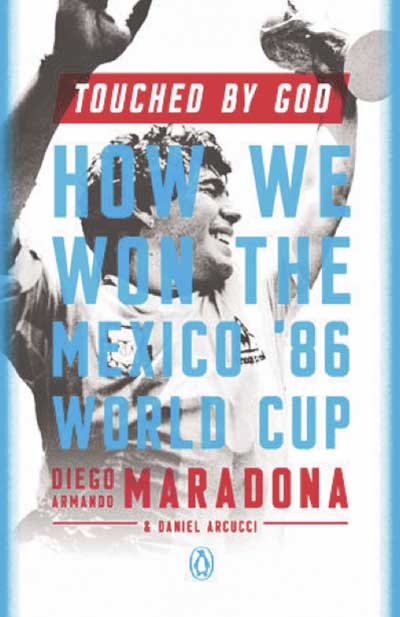
and Daniel Arcucci
£20, Constable
Reviewed by Rob Kemp
From WSC 365, July 2017
Buy the book
If the cover hints at a hagiography then the preface, by veteran Uruguayan journalist Victor Hugo Morales, does little to dispel the impression. Morales explains how, as a commentator at the tournament, he just kept saying “genius” over and over after Diego Maradona’s second goal against England in Mexico City on June 22.
His devotion hasn’t waned over time. “That day Diego wrote everything that could ever be written about soccer,” Morales writes. “He carried on his shoulders the promise of a newly democratic country that needed to show it could now be a champion.”
Thankfully, once Diego kicks in with his personal take on that tournament, the expectations and his contributions – both fantastic and fraudulent – the hyperbole eases. Watching the 1986 finals in full for the very first time – via a wall of TV screens in his Dubai home – Maradona explains how his own memories of matches jar or tally with the replay evidence from each Argentina game.
There’s no shortage of spite either, especially when describing his first goal against England: “It had been the hand of God, that God had also been thinking about all those boys slaughtered in the Malvinas – that’s what I feel today, 30 years later.”
Alongside the recollections of a man who wholeheartedly felt his destiny lay in lifting the World Cup that year, there is plenty of payback aimed at those who have crossed him over the years before and since 1986. We are told how Mexico’s sports shops were trawled at the last minute for the blue shirts worn against England, that Italy’s cycling sports scientists ensured his knee held fast, Argentina’s midfielders being banned from celebrating goals (to conserve their energy) and that Bonnie Tyler provided the motivational soundtrack to the team’s triumph (Total Eclipse of the Heart on the changing room sound system).
Such reflections are offset by his vengeful attitude towards some high-profile figures. Comments attributed to Pelé and “that French turkey” Michel Platini in the Argentinian press three decades ago – speculating on the impact Maradona will have ahead of the World Cup – are resurrected as Diego seeks to set the record straight. Meanwhile Daniel Passarella, one-time club and country team-mate and former friend, is accused of being a jealous snitch, suspected of having had a fling with another player’s wife and named by Diego as the player who racked up a 2,000 peso phone bill at the training camp which the rest of the team were forced to pay.
But Diego saves the bulk of his bile for Carlos Bilardo, national team coach in 1986, and the man who Maradona insists conspired to remove him from the same post in 2010. The tactics, team selection, choice of training camps and friendly opponents by Bilardo “the jerk that he was” are all pulled apart by a man who wants us to know that the team succeeded in spite of the manager not because of him.
Occasionally though there is open, honest contemplation on the author’s part over what turned out to be the pinnacle of his career. “Do you have any idea the player I would have been if it weren’t for the drugs?” he asks. “I would have been that player you saw in Mexico, for years on end.” We’re left to wonder what person he would have been too.